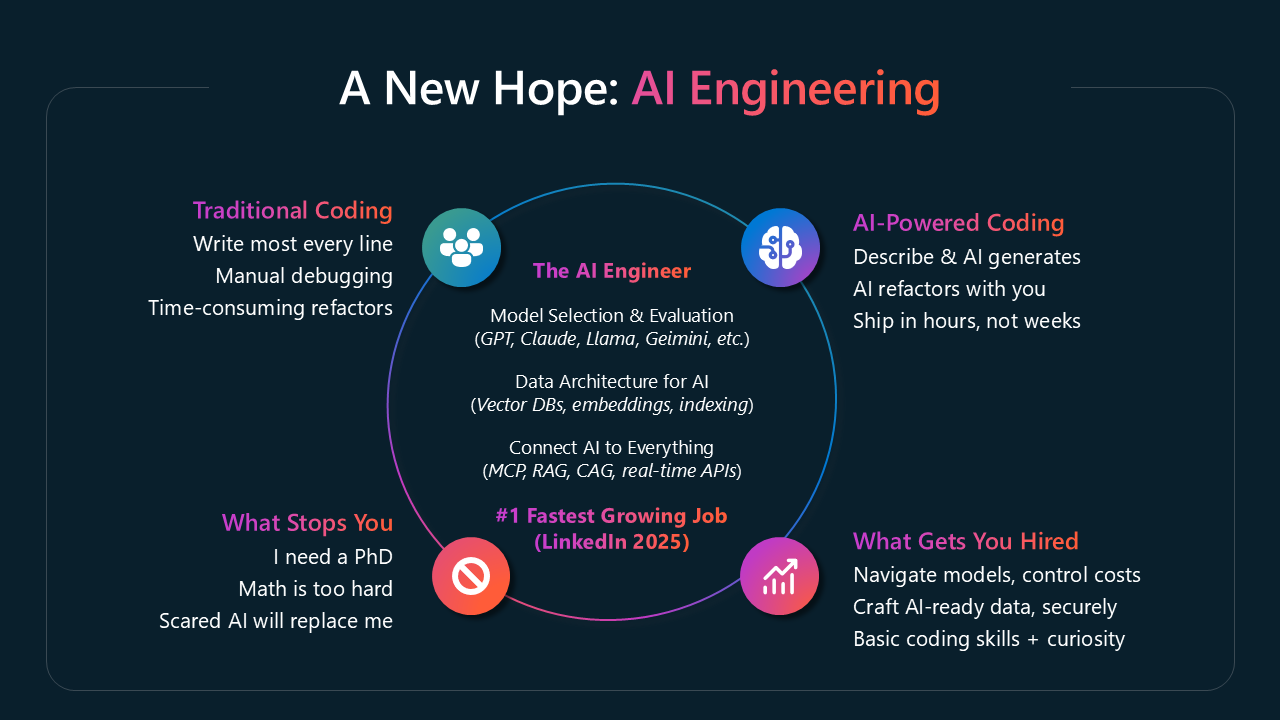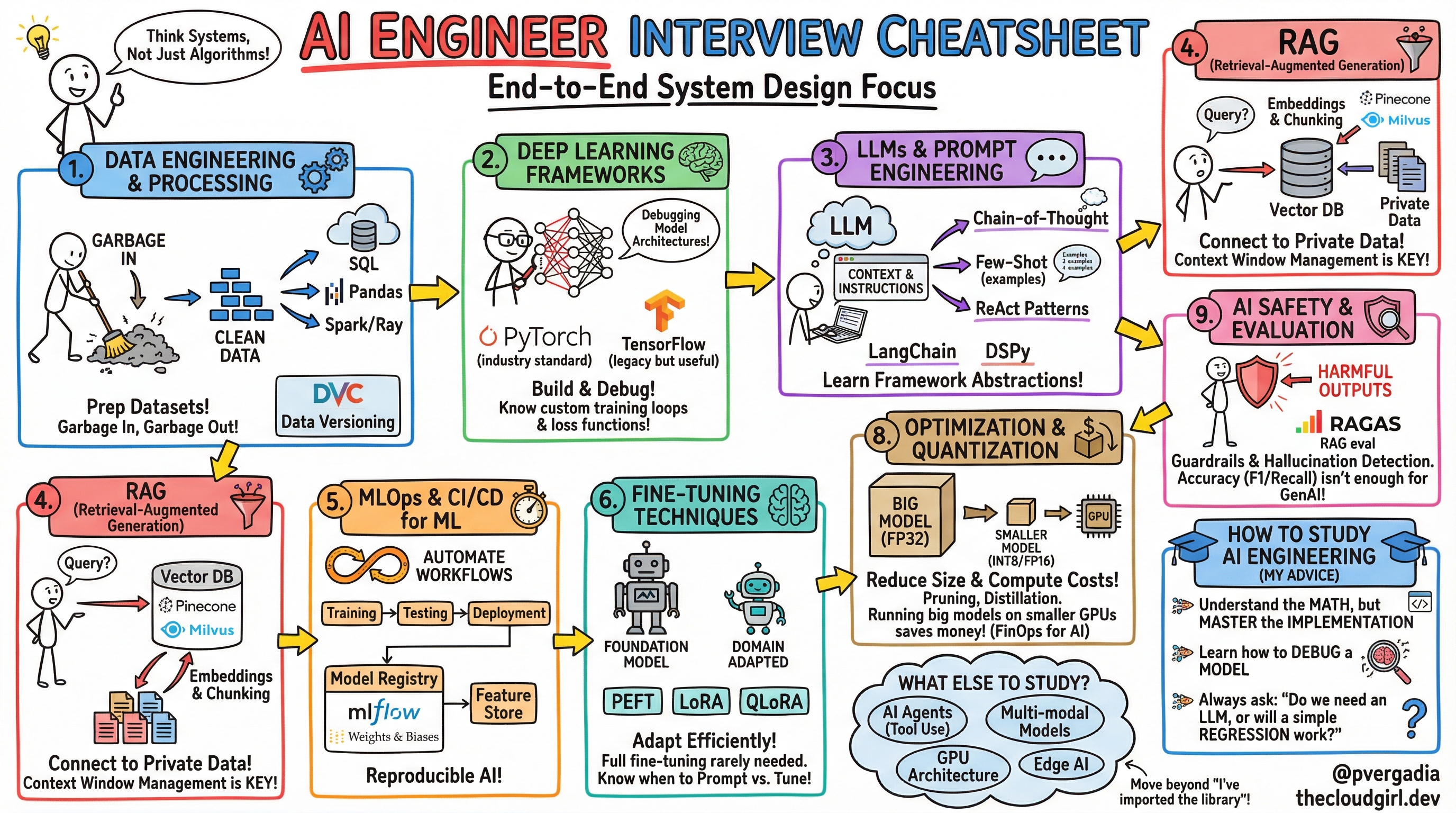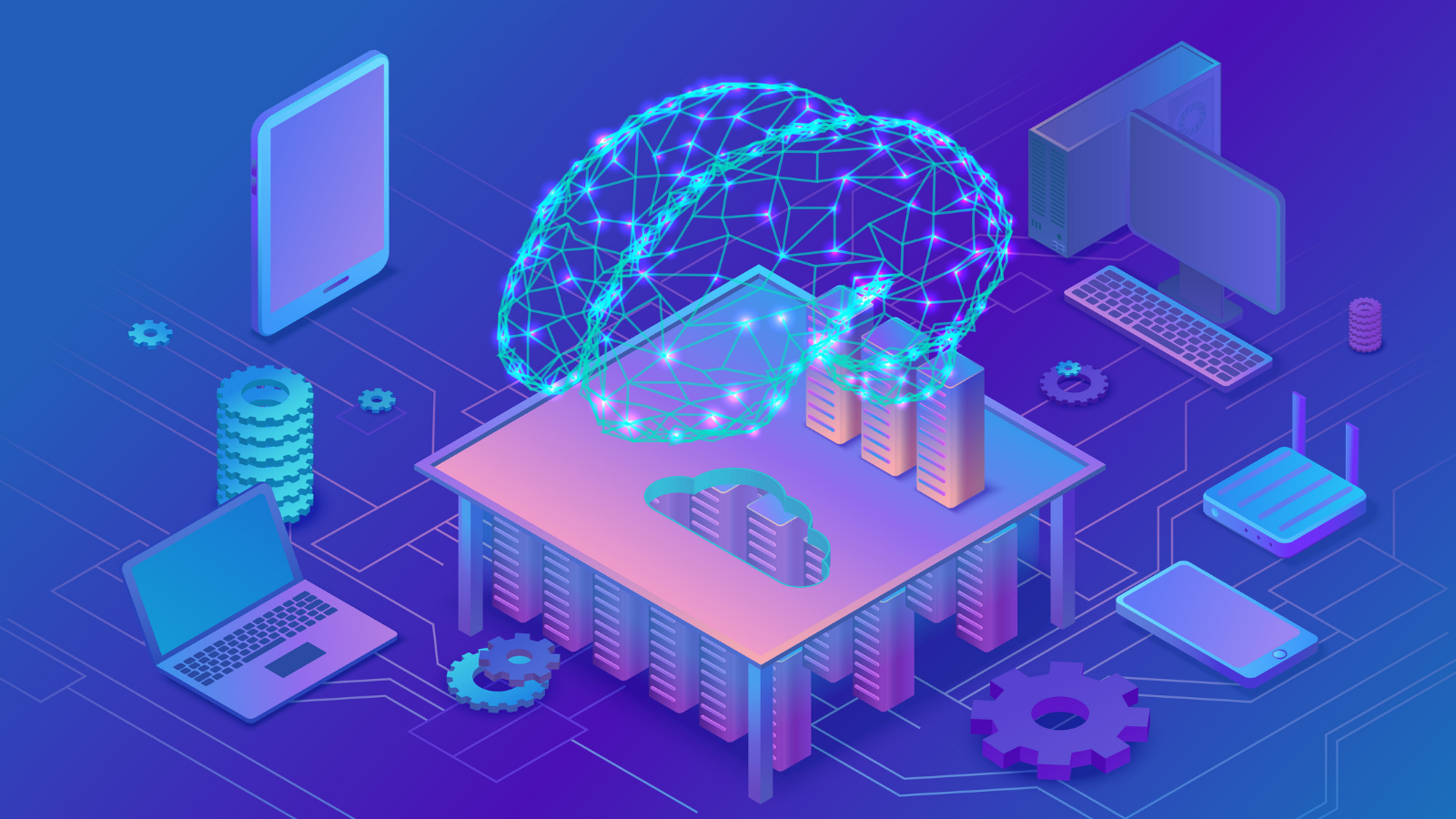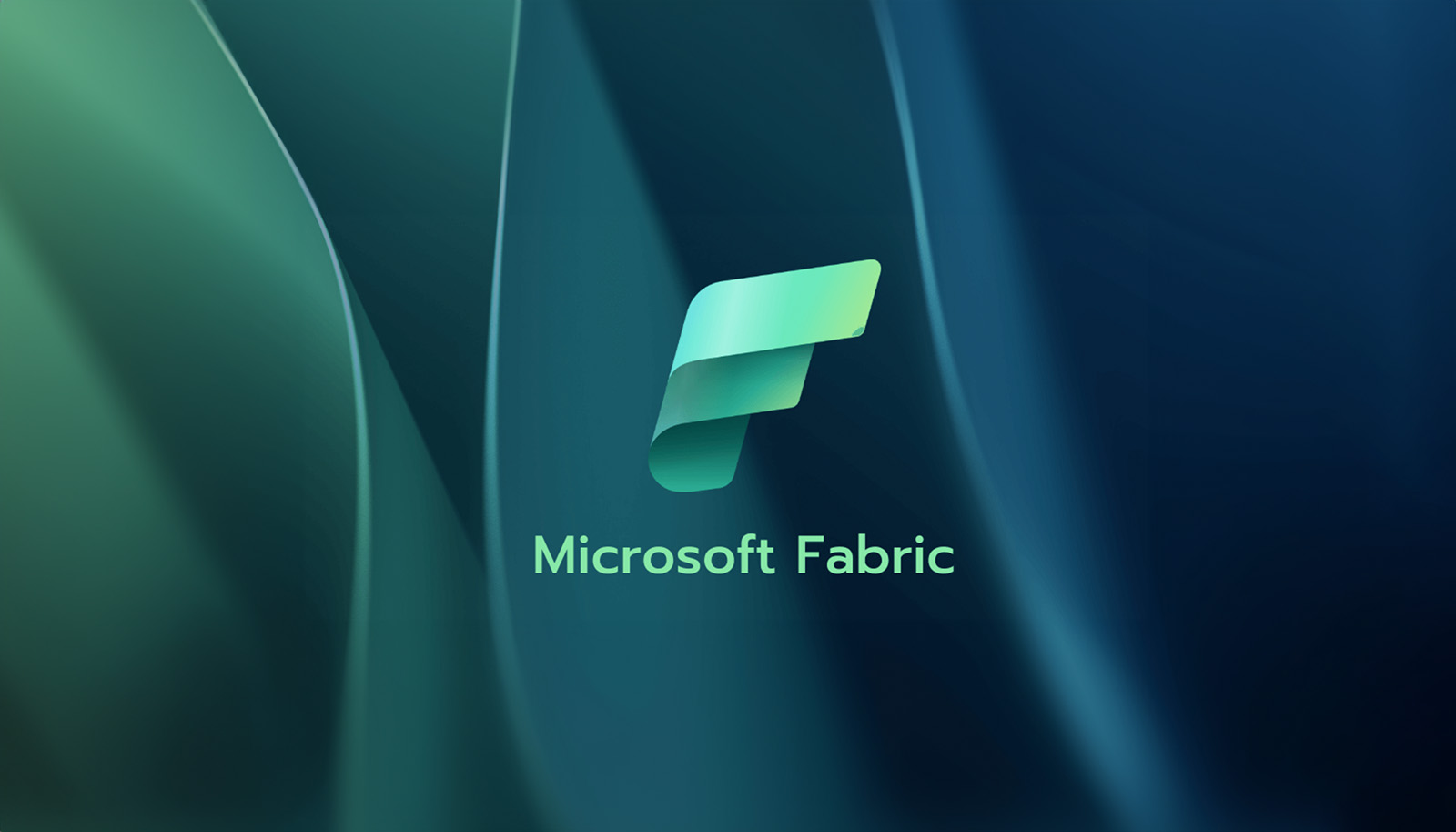Be sure to connect with me on LinkedIn to continue the conversation about AI, tech careers, layoffs, anime (watch Steinsgate 🙌), Marvel (The Fantastic Four: First Steps 🔥), the new DCU (Superman 👏), Christianity, society, philosophy, you name it!
What’s Up

Welcome! If you’re reading this, you might’ve scanned a QR code during my workshop at SEO’s 2025 Tech Developer Conference in New York. If you didn’t, that’s alright. The information written here remains relevant in perpetuity for anyone interested in the tech field and feeling anxiety.
That said, if you were at the conference and got a swag bag, I hope you enjoyed the fruit snacks! Speaking of which…
Aside: Funables are the apex fruit snack. Don’t talk to me about Welch’s. I know you grew up with them, so did I, but they’re trash. Motts, trash. Annie’s, trash. Gushers, not fruit snacks. Black Forest, solid. Scooby Doo, mid.
To learn more about me, you can check out my about page or my Charlotte Business Journal 40 under 40 profile. Otherwise, let’s get down to business.
Quick Guide
During the workshop, I promised resources and answers. Here’s where to find them:
Core Concepts:
- What Is AI Engineering? - Definition and why it matters
- It’s Easier Than You Think - Why you don’t need a PhD
- Why Coding Still Matters - The truth about AI and programming
Resources:
- What to Learn - The core competencies of AI Engineering
- Where to Learn - Free courses and tools
- Who to Follow - Key people and organizations
- What to Read - Essential articles
- Landing a Tech Job - Practical job hunting advice
Key Links:
- Workshop Slides
- AI Engineering GitHub List
- Free GitHub Copilot for Students
- Unlisted Microsoft Recruiters Group for Students
What Is AI Engineering?
It’s still a relatively new term, although it’s going mainstream, but here’s my attempt at a definition.
AI Engineering is the practice of building software that connects AI models to real-world systems and knowledge. While Machine Learning Engineers create the models, AI Engineers make them useful by providing the right context, tools, and interfaces for specific applications.
Real Spill: AI Engineering is just the evolution of Software Engineering. Most AI Engineers today still have “Software Engineer” or “Software Developer” as their job title, and probably will for a while.
I created this visual to illustrate what AI Engineering means in practice. It’s not perfect, but it gets the point across:

Aside: The image shows AI Engineer as the #1 fastest growing job title, which comes from LinkedIn’s 2025 Jobs on the Rise report.
Though honestly, this AI Engineer interview cheatsheet by Priyanka Vergadia is even better. This is really just about every domain you’d want to grow deep in if you want a future in tech on the technical side of things. This is stuff we still need humans to do that involves empowering, controlling, configuring, and working with AI.
Software development is so much more than writing code!

In general, think of Machine Learning Engineer vs. AI Engineer this way. They’re both athletes, but in different sports.
Maybe Machine Learning Engineers are playing baseball while AI Engineers are playing basketball. Both benefit from being athletic (technical skills), but they’re different sports requiring different tactics, and one is harder (baseball is harder than basketball, don’t @ me).
Or maybe it’s more like Machine Learning Engineers build the engine and AI Engineers build the car around it, customizing for how different kinds of people plan to use it.
I don’t know, no analogy is perfect. The point is, Machine Learning Engineers build the models, and AI Engineers take those models and build with them.
The term was popularized by Latent Space.
I think it is a full time job. I think software engineering will spawn a new subdiscipline, specializing in applications of AI and wielding the emerging stack effectively…The emerging (and least cringe) version of this role seems to be: AI Engineer.
And it’s got approval from Andrej Karpathy, former Tesla AI Director, OpenAI co-founder, and one of the most influential voices in the AI community.
In numbers, there’s probably going to be significantly more AI Engineers than there are ML engineers / LLM engineers. One can be quite successful in this role without ever training anything.
Another term you might hear is Context Engineering, which is essentially the same thing.
Context Engineering is the discipline of designing and building dynamic systems that provide the right information and tools, in the right format, at the right time, to give an LLM everything it needs to accomplish a task.
The terms are still evolving in this space, but both have caught on because they capture the same core idea. Making AI useful by giving it the right context.
It’s Easier, and That’s a Good Thing
At first glance, the term “AI Engineering” might sound intimidating, but let’s keep things real 💯. It’s way easier than being a Machine Learning Engineer.
To be a proper Machine Learning Engineer, you need to be good at math. Like, really good.
We’re talking calculus, linear algebra, statistics, probability theory, all that. And it’s customary for them to have PhDs. To command the kind of respect that researchers at OpenAI, Anthropic, Google, and Meta have right now, you’d need one.
Your path to being one of those people Mark Zuckerberg is throwing pro-athlete level contracts at is much longer and harder than your path to being an AI Engineer…where you can make a solid 6 figures at companies that already hire software developers.
I’m not alone in this sentiment:
In the near future, nobody will recommend starting in AI Engineering by reading Attention is All You Need, just like you do not start driving by reading the schematics for the Ford Model T.
Aside: Attention is All You Need is the research paper by Google that introduced transformers, the “T” in GPT. It’s a Machine Learning hallmark that paved the way for what eventually became OpenAI’s ChatGPT.
Funny thing is, I actually told people to read that paper in my AI learning guide. But you know what? I was wrong. You don’t need to go that deep to get paid in this field. You can, and should if you’re truly that passionate about AI, but to have a tech career both now and in the future, it’s not a must.
For me, you, and anyone wanting a tech career who isn’t great at math or trying to get a PhD, our reaction to the rise of AI Engineers should be:

Why Coding Still Matters
You can’t build serious systems, the kind companies up and down the Fortune 500 actually want, if you don’t understand code.
Vibe coding in its truest sense (no code review, just the end result) is not a real thing for people with paying jobs. There are no shortcuts to mastery.
To all my “vibe coding will get me hired in tech” people out there, I love you, but…

Aside: I haven’t watched Succession, and neither has Brian Cox, the actor in that gif. We’re both in agreement about avoiding good but stressful shows about deeply narcissistic, conceited, hedonistic people. I need at least one bastion of morality in my shows these days. Jon Snow, and Daenerys Targaryen before her tragic character assassination, are what got me through Game of Thrones. I need someone good, man. Someone.
Yes, AI can (and should) generate code for you, but if you have no idea what it’s doing, you’re flying blind. And no serious company is going to pay you to blindly copy-paste AI-generated code into their mission-critical (military, healthcare, infrastructure, financial, government, etc.) systems.
Sorry if that’s harsh, but I want to be sure I don’t have to go full…

…to get this point across.
So, are tech jobs going away? No! But they are for sure changing.
Sam Altman says the world wants 1000x more software. The CEO of GitHub says we need more programmers than ever. I’ve written extensively about this in my AI in tech careers post.
But the most compelling perspective comes from Andrew Ng. He co-founded Google Brain (they invented the “T” in ChatGPT), was Chief Scientist at Baidu, co-founded Coursera, and founded DeepLearning.AI. The entire Machine Learning community looks to him for training and guidance.
These two LinkedIn posts from him should reset your perspective on AI’s impact on tech careers:
Learning to code today isn’t about prepping for a future where you type every line yourself. We haven’t been doing that even before AI. High-level languages, Stack Overflow copy/paste, low-code tools, we’ve been doing anything and everything to make it easier to create software for a while now.
The future is being technical enough to orchestrate AI while you handle the problems that need human judgment.
Writing effective prompts, catching when AI hallucinates garbage, and debugging when things inevitably break. Those are the things no serious company will ever trust solely to a machine, and they’re what make you valuable and get you paid.
But you can only do these things if you can read and understand code, generate it with very specific prompts (essentially pseudocode), and occasionally, write it when needed.
AI in the Real World
Check out this Reddit discussion where software engineers and CTOs share their experiences with AI in the workplace. Companies that tried to replace humans with AI are regretting it, while those using AI to make their technical teams more efficient are getting more ambitious about projects. The result is more work than ever and a greater need for skilled humans who can use AI effectively.
This tracks with what Sam Altman said about the world wanting “1000x more software.” AI makes developers more productive (well…it depends), which means companies can tackle bigger projects and expand into new areas. Instead of replacing developers, this creates more demand for people who understand both technology and how to leverage AI tools.
For the technical analysis on why this happens, check out Why LLMs Can’t Really Build Software. It explains exactly why AI struggles with the mental models and iterative problem-solving that experienced developers excel at. The community discussions about that article on Hacker News and Reddit are also very insightful.
When it comes to building software, AI helps humans get things done. It doesn’t eliminate the need for them. It’s been a minute since OpenAI released ChatGPT in 2022. We’re not guessing anymore about how it’s impacting the industry. We know. AI Engineering is a real thing, and it’s the future of the field. One that keeps humans in the loop. Rejoice!
What to Learn
If you ever thought you could be a Software Engineer (or Software Developer, literally the same thing, don’t let anyone tell you otherwise), then you can be an AI Engineer.
The same fundamental skill of coding is required, but you also need a solid understanding of the technical areas that AI Engineers (mostly still called Software Engineers) work with day-to-day.
Many of these are areas that real-world software engineers already deal with. Its the stuff beyond just coding that often surprises new grads when they start building production systems at scale.
Here’s what you’ll need to get familiar with:
Data Stuff
AI systems are only as good as the data they work with. To make data “AI-ready,” you need to organize it so AI can find answers quickly.
AI doesn’t understand text like we do. It converts everything into numbers called vectors (think of them as coordinates that capture meaning).
A vector database is like a search engine built for these numbers, letting AI find similar content even if the exact words don’t match. This is called semantic search, which means searching by meaning, not just keywords.
- Vector Databases: Postgres with pgvector, Pinecone, Weaviate, Azure AI Search. These store and search vectors efficiently.
- Vector Indexes & Optimization: Vector indexes, Vector optimization and index strategies for fast data retrieval.
- Embeddings & Indexing: Understanding vector embeddings, which is how text gets converted to numbers that capture its meaning.
- Basic SQL & Data Foundations: Still the backbone of all data work. Even Apache Spark uses SQL syntax as the preferred interface.
AI-Specific Technologies
- Retrieval Augmented Generation (RAG): Understanding what RAG is, and building RAG systems to connect AI to a company’s data.
- Cache Augmented Generation (CAG): Optimizing AI responses with intelligent caching strategies, which some are saying is the successor to RAG.
- Model Context Protocol (MCP): Connecting AI to external systems, the foundation of agentic AI.
- Model Selection & Evaluation: Choosing between GPT, Claude, Llama, Gemini, DeepSeek, etc. based on cost, performance, and use case.
- Responsible AI: Bias detection, content filtering, ethical AI practices.
System Architecture
- APIs: Building and consuming REST APIs, understanding OpenAPI specifications for AI-discoverable APIs, and API versioning strategies for maintaining production systems.
- System Design: Designing scalable AI systems that don’t crash under load.
- Networking: A basic understanding of computer networking because AI runs on…computers. Cloud Networking, specific to the service provider you’re building with (guides for Azure, GCP, and AWS), how data flows between services (ETL), load balancing, CDNs.
- Cloud Platforms: Azure, AWS, Google Cloud. Pick one and dive in, entire careers are built just understanding one of these.
Infrastructure & Operations
- DevOps & CI/CD: GitHub Actions, Terraform, Azure Bicep, containerization with Docker, and if you’re into suffering, Kubernetes.
- Cost Optimization: FinOps, token optimization, caching strategies, choosing the right model size.
- Business Continuity, High Availability, Disaster Recovery: Building resilient systems that feature disaster recovery.
- Monitoring & Alerting: Application Insights, Prometheus, Grafana, Splunk for system health.
These aren’t things you need a PhD to learn. You don’t even really need a bachelor’s (although it certainly helps). You can learn all this stuff online.
Where to Learn
If you know basic Python, or any programming language, you’re ready to start. If not, begin with Google’s free Python course. After that, dive in.
Free Resources for Students
- GitHub Student Developer Pack: Free GitHub Copilot Pro, credits, and more.
- Azure for Students: $100 in Azure credits, no credit card required.
- Microsoft Student Certifications: Free certification exams.
- Microsoft Student Hub: Central resource for student learning.
- Student Ambassadors: Become a Microsoft rep on campus.
AI Engineering Courses
Check out my AI Engineering list on GitHub (some listings are repeated below).
- Get Started with GitHub Copilot in VS Code: DO THIS FIRST
- AI for Beginners
- AI Agents for Beginners
- MCP for Beginners
- Generative AI for Beginners Python
- Generative AI for Beginners JavaScript
- Generative AI for Beginners .NET
- GitHub Copilot Coding Adventures
- Mastering GitHub Copilot
- Mastering GitHub Copilot for C#/.NET Developers
- MCP Course on HuggingFace
Tools to Focus On
Stick with what most companies use. Don’t chase every hot new tool from a startup that’ll eventually be acquired by big tech (looking at you Windsurf, Replit, Inflection, and eventually, Cursor).
- VS Code: The IDE everyone uses. Even Cursor is just a VS Code fork. The industry isn’t leaving VS Code. Microsoft’s vertical integration owning it and GitHub and Azure and a chunk of OpenAI is insane. Investing in being a VS Code power user is time well spent.
- GitHub Copilot: Free for students. GitHub is owned by Microsoft, so it’s integrated everywhere. Specifically, it’s the preferred AI coding tool of VS Code.
- Claude Code: Terminal-based AI-coding tool that works with any IDE (including VS Code). From Anthropic, it’s the real deal. A competitor to GitHub Copilot. Amazon is behind Anthropic, so this product has staying power.
- GitHub Spark: GitHub’s answer to vibe coding tools like Lovable. Great for personal projects, micro apps, greenfield development, prototypes, etc.
Who to Follow
The tech community lives more on LinkedIn, Twitter (its real name), Reddit, and Hacker News than TikTok, Instagram, or Snapchat.
Tech people usually want to post and discuss without needing a picture or video to accompany it. Make a Twitter account just to follow these people if you need to.
The Top Tier
- Andrej Karpathy: OpenAI co-founder, former Tesla AI Director, now focused on AI education. Created Stanford’s CS231n course that launched countless ML careers. The most trusted voice among both Machine Learning and AI Engineers regarding the state of the industry. Coined the term vibe-coding. Follow on Twitter, LinkedIn, YouTube.
- Simon Willison: Co-creator of the Django Python framework as well as various other open source projects. One of the leading voices on the deeply technical side of system design around LLMs and AI agents, especially security (prompt injection), retrieval patterns, evaluation, and pragmatic tooling. Frequently cited in posts and engineering write-ups by practitioners (including at tech orgs like Meta and Anthropic) because he explains complex stuff with amazing clarity. Famously tweeted “Quitting programming as a career right now because of LLMs would be like quitting carpentry as a career thanks to the invention of the table saw”, a perfect reminder not to abandon your tech career because of AI. Truly a quality follow. Follow on Twitter, LinkedIn, and his Blog.
- Andrew Ng: Founded Coursera, Google Brain, and DeepLearning.AI. Pioneered online ML education. Co-led Google Brain’s 2012 “cat-recognition” breakthrough that kicked off the modern Deep Learning era. Twitter, LinkedIn.
- Yann LeCun: Meta’s Chief AI Scientist, Turing Award winner, and respected voice in the AI community, particularly regarding the tech industry’s future with it. LinkedIn, Twitter.
- Sam Altman: OpenAI CEO. Twitter.
- Ian Goodfellow: Invented GANs, real technical AI heavyweight. Twitter, LinkedIn.
- Jeff Dean: Google’s AI legend. Twitter.
- Priyanka Vergadia: Cloud and AI Tech Executive known for making incredible visuals offering guidance on all things AI Engineering. Quality follow to stay on top of what to be learning and getting involved in if you want to work in tech in our AI driven future. Blog, LinkedIn, Twitter, Instagram.
- Pamela Fox: Principal Cloud Advocate at Microsoft. A relentless builder/teacher constantly dropping new tutorials, samples, workshops, and deep-dives on GitHub, VS Code, and Azure for real-world AI engineering (and broader dev productivity) scenarios. If you want a steady stream of practical “here’s how to actually ship with AI” content plus approachable explanations, she’s elite. Top tier follow. LinkedIn, GitHub, Twitter.
- Marcus Fontoura: Technical Fellow (the highest technical rank at Microsoft, reserved for the absolute best) and Chief Technology Officer for Azure Core at Microsoft. Previously Google Staff Research Scientist among other deeply technical and challenging roles. I share this to say, this guy knows his stuff. Check out his article, You Should Still Study Tech—Even if AI Replaces Entry Tech Jobs. Stop listening to people with minimal experience and shoddy technical skills scaring you on TikTok, Instagram, YouTube Shorts, Snapchat, and Reels. They just want views for ad revenue. Listen to people who understand how AI works under the hood. Who have skin in the game when it comes to building software. People with real technical depth and career wisdom. LinkedIn, Website.
- Alberta Tech: Hilarious, actually a developer, so her memes about AI are both accurate and insightful. TikTok, Instagram, Twitter, YouTube.
- David Fowler: Microsoft distinguished engineer (a big deal). Huge in the .NET space, and thereby how AI is landing there. Twitter, LinkedIn.
- Gergely Orosz: Runs The Pragmatic Engineer newsletter with deep dives on industry topics, especially AI and software development. It’s a paid subscription, but snippets and insights are sometimes posted for free and shared on his socials. LinkedIn, Twitter.
- Hamel Husain: Expert in LLM evaluations and RAG (Retrieval-Augmented Generation) systems. Often shares and blogs about deeply technical techniques. LinkedIn, Twitter, YouTube.
- Eleanor Berger: Software developer deep in agentic coding, experimenting with every new tool and model, and sharing learnings in blog posts. LinkedIn, Twitter, YouTube.
- Isaac Flath: Another software developer deep in agentic coding, experimenting with every new tool and model, and sharing learnings in blog posts. LinkedIn, Twitter.
- Drew Breunig: Technologist with thoughtful blog posts about LLMs and their practicality in industry. LinkedIn, Blog, Twitter.
- Gary Marcus: Machine Learning researcher skeptical of the current AI hype. Posts about flaws in transformer-based LLMs, security issues, and quality failures. A healthy counterbalance to the optimists. LinkedIn, Twitter.
Organizations
Communities
- Latent Space: The folks who coined “AI Engineer” and a leading publication for the community. Twitter, YouTube
- AI Engineer: A group aimed at bringing structure to the AI Engineering community with annual events, Twitter, YouTube.
- Hacker News: Where Y Combinator startups get feedback. Like Reddit but for real technical discussions only, no fluff.
- r/ExperiencedDevs: Perspectives from engineers with real experience. Avoid r/cscareerquestions, it’s mostly repetitive questions, fear-mongering, and karma farming.
- r/LLMDevs: AI Engineers sharing tips and tricks.
- r/LocalLLaMA: Probably the biggest AI Engineering community on the Internet.
- r/vibecoding: The largest online community of people pushing the limits of what AI can build for someone who doesn’t know what they’re doing. It’s a great place to hangout to wake yourself up to just how capable models are becoming.
- r/ChatGPTCoding: The name no longer reflects the broader scope of this subreddit, which is people using AI to build things and sharing tips and tricks along the way.
What to Read
Must Read: Marcus Fontoura, Technical Fellow (the highest technical rank) and Chief Technology Officer for Azure Core at Microsoft, wrote You Should Still Study Tech—Even if AI Replaces Entry Tech Jobs for TIME Magazine. This op-ed perfectly captures why pursuing computer science remains a viable choice for students. This is the wrong time to run away from tech because the current job market and social media is scaring you. Its never been easier to be an effective technologist with AI handling a lot of the grunt work, and humans doing the real problem solving. Coming from someone who’s built search infrastructure at Google, cloud platforms at Microsoft, and has decades of experience leading complex technical organizations, his perspective carries serious weight. Read the article.
AI Basics
On Coding's Future
On AI Engineering
Critical Perspectives
Landing a Tech Job
The shortest and sweetest advice I can give is apply early and often. It took me 112 applications back in 2020, 3 of which resulted in interviews, and only 1 of which resulted in an offer, to get in with my current employer.
Some people might hear that and think:

But that’s what it takes. You’ve got to hustle, hard.
If you’re in college, literally when you arrive on campus in the Fall, it’s time to apply for internships. Set aside a few minutes every day, download LinkedIn to find positions, use Easy Apply, set up job alerts on Indeed.
If your goal is big tech, check the Microsoft, Google, Amazon, Meta, and Apple student career pages regularly. The big tech companies are always posting, and sometimes at different stages, so you really got to keep an eye on their websites.
I’ve written extensively about this in my AI in Tech Careers and Miscellaneous Tech Career Advice posts. But honestly, if you’re with SEO, you’re probably doing just fine with finding internships as they have great resources.
For those specifically interested in Microsoft
- Microsoft Recruiters LinkedIn Group: This group isn’t discoverable through search, someone’s got to send you the link, and I just did. If you want a Microsoft internship, join this group NOW and keep an eye on it. Recruiters post opportunities here first.
- Microsoft Careers: Main careers site, bookmark it.
- Early in Profession: Your hub for internships and early career opportunities.
- Explore Microsoft: Special internship program for college freshmen and sophomores.
- Microsoft Hiring Tips: Microsoft specific tips on what they’re looking for.
- Career Paths at Microsoft: Details on the many career paths, including many that aren’t technical and don’t require any coding or understanding of tech, at Microsoft.
- Student Certifications: Microsoft lets students take certification exams for free. Good stuff to throw on your resume.
- Student Ambassadors: Become a Microsoft rep on your campus.
- AI Skills Navigator: A tool that uses AI to help you learn AI that Microsoft is pushing hard right now.




